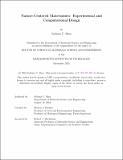Nature-Centered Materiomics: Experimental and Computational Design
Author(s)
Shen, Sabrina C.
DownloadThesis PDF (228.5Mb)
Advisor
Buehler, Markus J.
Terms of use
Metadata
Show full item recordAbstract
As of the year 2020, the accumulated mass of anthropogenic materials now outweighs all living biomass on Earth. Industrial material production simultaneously contributes nearly 30% of global greenhouse gas emissions each year, which in conjunction with solid waste accumulation and deterioration of ecological processes, threatens the livelihood of current and future generations of both human and non-human species. This is in dramatic contrast with natural materials, which consistently outperform human engineering, yet are invariably produced using abundant, renewable sources of energy and upon their disuse, decompose to fuel new growth. Nature effectively forms sustainable supply chains with no waste by leveraging both the constituents of materials and their structural organization at multiple scales, architecting common and abundant building blocks into a variety of high-performing composites. In this thesis, we present a nature-centered materiomics approach to emulate this in the design of novel sustainable materials. We leverage both computational and experimental strategies to consider multiple length-scales and time-scales across the processing, structure, properties, and performance of material systems with minimal ecological impact. First, we demonstrate machine learning strategies for harnessing functional geometries in natural materials and demonstrate how interpretable models can be leveraged toward novel material design. Next, we develop a platform for the fabrication of tunable biocomposites composed of renewable and biodegradable feedstocks, and consider Bayesian optimization as an approach to guide composite optimization and design. Finally, we extend the fabrication system to hybrid-living materials and demonstrate dynamic bio-welding capabilities in the strongest mycelium-based material in the literature to-date. Altogether, these contributions enhance multiscale understanding of nature-centered material design and pave the way for future innovations that align human engineering with regenerative material cycles.
Date issued
2024-09Department
Massachusetts Institute of Technology. Department of Materials Science and EngineeringPublisher
Massachusetts Institute of Technology